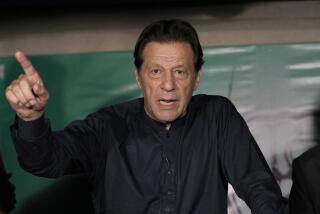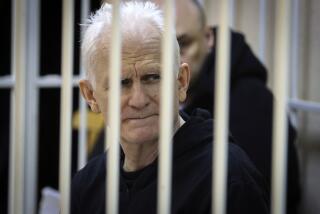Pakistan court frees disgraced nuclear scientist
A Pakistani court Friday freed nuclear scientist A.Q. Khan from unofficial house arrest, capping a rehabilitation that began almost from the moment he confessed in 2004 to secretly selling sensitive nuclear technology to rogue regimes around the world.
Khan, the architect of Pakistan’s nuclear program, held a jubilant impromptu news conference outside his home on a tree-lined street in the capital. “I have got my freedom,” he told reporters shortly after the ruling by the Islamabad High Court.
Many international experts consider Khan’s alleged activities over a 15-year period, which reportedly included providing atomic secrets to Iran, North Korea and Libya, to have been highly damaging to efforts to control nuclear proliferation.
The full text of the court ruling was not released, but a short statement confirmed that the panel of High Court judges had declared Khan a “free citizen.” His lawyer, Ali Zafar, said he had been cleared of all charges, but the statement made no such reference.
Pakistani government officials were tight-lipped about the development. The Foreign Ministry said in a statement after the court ruling that it considered Khan’s case closed.
American officials expressed concern about the situation. “Let me say that in our view it would be unfortunate if the court released him,” said acting deputy State Department spokesman Gordon Duguid. “We believe A.Q. Khan remains a serious proliferation risk. The proliferation support that Khan and his associates provided to Iran and North Korea has had a harmful impact . . . on international security, and will for years to come.”
Pakistani officials suggested that some restrictions on the scientist’s movements might remain in place. Prosecutor Amjad Iqbal Qureshi said the 72-year-old Khan, who suffers from a variety of ailments including prostate cancer, would be subject to “security measures,” but did not give details. Khan’s lawyer said Khan was willing to accept personal protection.
The issue is clouded by the fact that the government never formally acknowledged that Khan was under house arrest, though guards stationed outside his villa for the last five years have curtailed his comings and goings and screened visitors.
Last year, he was allowed some limited travel privileges, including a trip to the port city of Karachi, and he began granting interviews to Pakistani media.
Though widely viewed in the West as a disgraced figure, Khan is regarded by many Pakistanis as a hero. Nationalist sentiment has surged in recent months, with many here angered by U.S. missile strikes targeting militants in Pakistan’s tribal areas.
After confessing on Pakistani TV to his involvement in the international nuclear black market, Khan was pardoned by then-President Pervez Musharraf and largely confined to his home.
Pakistan has refused to make him available for questioning by international nuclear regulatory authorities and other investigators, a policy unchanged by the new civilian government. As recently as last month, Prime Minister Yusaf Raza Gillani said International Atomic Energy Agency representatives would not be given access to Khan. Asked by reporters at his home Friday about his role in selling atomic secrets, Khan, clad in a loose shirt and slacks, said: “We don’t want to talk about the past.”
Domestic politics may have played a role in the decision to ease restrictions on the scientist. Analysts pointed to pressure from the party of former Prime Minister Nawaz Sharif, who presided over Pakistan’s first nuclear test in 1998 and has been a strong supporter of Khan. Sharif’s popularity is thought to rival or exceed that of the government.
“This won’t satisfy everyone, but it takes some of the pressure off,” said Adil Najam, a professor of international relations at Boston University.
Repercussions of Khan’s activities continue to be felt. Last month, more than a dozen companies and individuals were sanctioned by the U.S. State Department over ties with his nuclear network. Khan has been the subject of at least two recent books by authors who believe the full extent of his malfeasance has never come to light.
“Only pressure from the international community, including the United States, can open the door to Khan’s knowledge,” coauthors Douglas Frantz and Catherine Collins wrote in an op-ed piece published in June in the Los Angeles Times. Frantz is a former managing editor of The Times and was recently appointed as chief investigator for the Senate Foreign Relations Committee.
In interviews granted during his house arrest, Khan has been unrepentant, saying the Musharraf government was aware of his activities and he had been made a scapegoat. On Friday, he again described himself as a patriot.
“I don’t care about the rest of the world,” he said. “I care about my country. . . . I will always be proud of what I did for Pakistan.”
--
Zaidi is a special correspondent.
More to Read
Sign up for Essential California
The most important California stories and recommendations in your inbox every morning.
You may occasionally receive promotional content from the Los Angeles Times.










